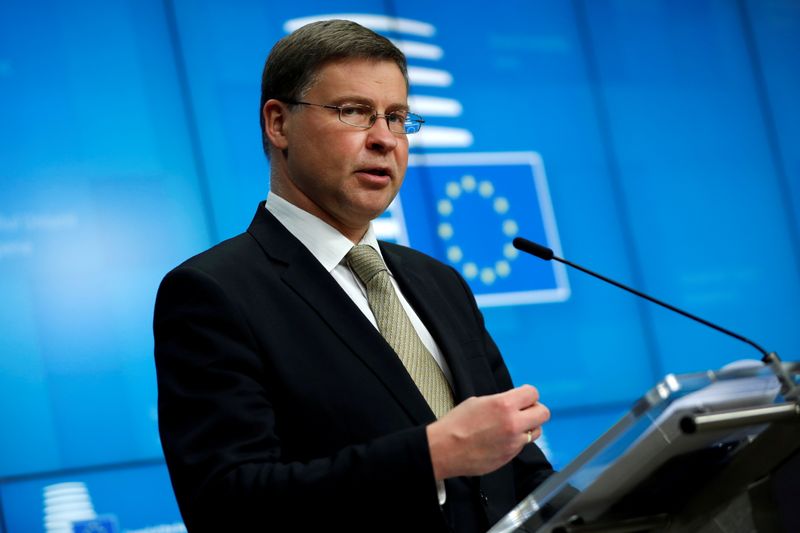By Philip Blenkinsop
BRUSSELS (Reuters) -The European Union and the United States are working to resolve a dispute over subsidies to aircraft makers and should be able to do so by July, the EU's trade chief said on Thursday in a further sign of improving transatlantic trade ties.
Both sides agreed in March to suspend tariffs on billions of dollars of imports in a 16-year-old dispute at the World Trade Organization over subsidies for planemakers Airbus and Boeing (NYSE:BA). The suspension runs until July 10, with tariffs re-applying on July 11 if there is no solution.
"We had intensive and broad discussions on this topic with U.S. Trade Representative Katherine Tai last week and so during today's video conference she confirmed this timeline," European Commission vice president Valdis Dombrovskis told a news conference.
"The work is advancing so I would say this timeline is realistic. Of course it requires effort from both sides."
While U.S. President Joe Biden has made clear his focus remains on protecting American jobs, European officials hope his administration will make trade ties with the United States more predictable than during the Donald Trump presidency.
German Economy Minister Peter Altmaier described the talks with Tai as "extremely constructive".
"I think we are entitled to say that there is a historic window of opportunity to resolve trade disputes between Europe and the U.S.," he told reporters.
Earlier this week the Commission, which oversees EU trade policy, declared a partial truce in a three-year dispute over U.S. tariffs on steel and aluminium, saying it would not impose retaliatory tariffs on more U.S. products. [L5N2N42PT]
"All in all, it's now more than 100 days since the Biden administration entered office and we have seen many positive developments and much more active engagement," Dombrovskis said.
Dombrovskis said U.S. metals tariffs and the EU's initial retaliatory duties from 2018 should be removed as soon as possible, and in any case by the end of the year. He said both the EU and the United States were working on this timeline.
Separately, 12 EU countries including Germany, called for an extension of steel "safeguard" quotas beyond their expiry at the end of June to protect industry from a flood of imports.
Dombrovskis said the Commission should present a proposal in early June, adding there was a difficult balance to be made between steel-making and steel-consuming industries.
"If we extend beyond three years, as would be the case, we open ourselves to legal retaliation by third countries," he continued.
Another area of emerging consensus between the EU and United States is the need for a tougher line on China. Their partial truce included a joint statement on the need to "hold countries like China that support trade-distorting policies to account".
Separately, the European Parliament on Thursday halted ratification of an investment pact with China until Beijing lifts sanctions on EU politicians, deepening a dispute in Sino-European ties and denying EU companies greater access to China.
The resolution to freeze ratification passed with 599 votes in favour, 30 votes against and 58 abstentions.
Beijing's punitive measures, blocking travel to China and business with its companies, were imposed in March in response to Western sanctions against Chinese officials accused of the mass detention of Muslim Uyghurs in northwestern China.

EU lawmakers say the Chinese sanctions are not based on international law, while the bloc's measures tackle abuses of human rights upheld in United Nations treaties. Beijing denies any wrongdoing.
Despite all the tensions, Germany earlier announced that exports to China in April rose by 16.3% year-on-year to 8.4 billion euros. It also said exports to the United States leaped by more than 60% to 10.1 billion euros in the same period, underlining the importance of trade to Europe's top economy. [S8N27Z087]